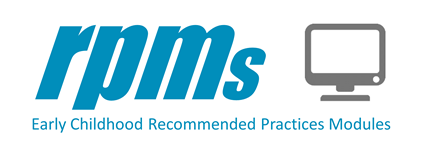Resource Search
Keyword Search
41 results found
Resource from the Technical Assistance Center on Social Emotional Intervention (TACSEI) for supporting children's social emotional development.
Classroom tool for identifying children's interests related to early language and literacy from the Center for Early Literacy.
Dr. Jeanette McCollum answers questions about early interactions.
Citations for each of the practices include best available research in the form of research reviews or syntheses as well as the most recent and relevant individual studies evaluating specific DEC Recommended Practices on Interaction.
Additional resources to help you learn more about child interactions.
This checklist includes the kinds of adult (parent or practitioner) behavior that can be used to engage a child in adult-child Interactive episodes to promote and support child competence. The main focus of the practice is responding contingently to a child’s behavior to elicit or maintain child interactions with an adult during everyday activities and play.
DEC Recommended Practices list for Interaction
Dr. Beth Rous Answers Questions about Program Transitions
A collection of resources supporting the DEC Recommended Practices for Transition.
A collection of additional resources on supporting children during transitions.
List of DEC Recommended Practices for Transition
This checklist includes practices to support the transition of toddlers from early intervention services into preschool or preschool special education services.
Implementing Planful and Timely Transition Sample Strategies; includes five strategies, purpose, when (to use), transition goal, and practitioner role
Drs. Lori Erbrederis Meyer and Tricia Catalino Answer Questions about Early Childhood Environments
A collection of resources that support the DEC Recommended Practices for Environment.
List of DEC Recommended Practices for Environment
Chelsea Guillen Answers Questions about Teaming and Collaboration
A collection of resources supporting the DEC Recommended Practices for Teaming and Collaboration.
List of DEC Recommended Practices for Teaming and Collaboration
This checklist includes steps and actions teams can take to ensure that families are included as full team members and are valued as experts who are considered vital to effective team functioning.
Dr. Carol Trivette answers questions about family.
List of DEC recommended practices for family.
Ask the Expert content from Dr. Ilene Schwartz for the Instruction Module
List of DEC Recommended Practices for Instruction.
Ask the Expert content from Jane Squires for the Assessment Module.
DEC Recommended Practices list for Assessment
IDEA Statute and Regulations for Part C – Infants and Toddlers with Disabilities
IDEA Statute and Regulations for Section 619 of Part B
This checklist includes key characteristics of authentic assessment practices for observing child participation in everyday activities, the real world learning opportunities that occur in the activities, child behavior in the everyday learning opportunities, and the particular learning opportunities that provide a child the richest array of competency-enhancing learning opportunities.
The Individualized Family Service Plan (IFSP) is a written plan that is developed for each eligible infant and toddler with a disability. The Part C regulations specify, at 34 CFR §§303.342 - 303.345, the procedures that State Lead Agencies and early intervention service providers must follow to develop, review, and revise an IFSP for each child. The document below sets out the IFSP content that those regulations require.
Vignette of 3 year old Maya for transition from early intervention to preschool.
Vignette for high intensity and low intensity transition strategies.
Vignette of Juan, aged 3 months, describing a hospital to early intervention transition.
Vignette for transition from preschool to kindergarten
Vignette example of providing opportunities for a child to practice a skill.
Recommendations, with specific indicators of effective practice, intended to help policy makers, program administrators, teachers, and others improve screening and assessment practices for young English language learners.
